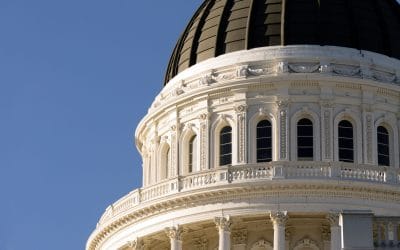State invests $6 billion in broadband infrastructure over 3 years
A problem that has been persistent in California for years, the digital divide was highlighted in a major way when the COVID-19 pandemic hit. Perhaps more than any other sector, schools felt the impact of a sudden and almost total reliance on access to high-speed internet. In an effort to help remedy the issue, bills were quickly introduced in both houses of the state Legislature in 2020 and 2021. However, one of the most significant proposals this year came via enactment of the state budget.
SB 156 (Committee on Budget and Fiscal Review) contained the implementing language for a $6 billion investment in broadband infrastructure over three years. The proposal, comprised mostly of federal American Rescue Plan Act (ARPA) dollars, contained three major provisions, including:
- $3.25 billion in ARPA funds for the construction of open-access broadband middle mile, appropriated in 2021-22
- $2 billion ($928 million General Fund and $1.072 billion ARPA) for last mile funding, of which $1.072 billion is available in 2021-22, $125 million is available in 2022-23, and $803 million is available in 2022-24
- $750 million General Fund for the loan-loss reserve, of which $50 million in appropriated is 2021-22, $125 million is appropriated in 2022-23 and the balance of $575 million is included in 2023-24.
With so much money being allocated to this issue, the Legislature and Administration will undoubtedly be monitoring how the dollars are spent as California rolls out current and future broadband projects. In particular, the open-access, middle-mile projects will be under scrutiny. At the time of this writing, the President of the California Cable and Telecommunications Association (CCTA) had already publicly criticized the California Public Utilities Commission’s (CPUC) handling of the rollout. Being such a high-stakes investment for the state, this issue will certainly be watched closely not only next year, but over the next several years.
California Advanced Services Fund (CASF) Extended
You may recall AB 570 (Aguiar-Curry, D- Woodland) and SB 1130 (L. Gonzalez, D-Long Beach) which were both authored in 2020. These two bills were amended mid-session in response to the COVID-19 Pandemic, and sought to make changes to the CASF to better help California tackle the digital divide (which was suddenly a glaring issue). Both bills died in the eleventh hour of the 2019-20 Legislative Session amidst heavy lobbying by opponents, but both authors noted they would continue to pursue solutions to the digital divide in 2021.
Accordingly, AB 14 (Aguiar-Curry) and SB 4 (L. Gonzalez) were both introduced on the very first day of the 2021-22 Legislative Session. The bills saw several sets of amendments throughout session. Specifically, once the broadband budget deal (detailed above) came together, the two authors – who had been working closely together all year – amended their bills to primarily deal with the CASF, one of California’s primary means of funding broadband projects.
The CASF and the surcharge that funded it were set to expire at the end of 2026, and 2022, respectively. AB 14 extends the authority of the CPUC to continue collecting the surcharge to fund the CASF through 2032. SB 4 extends the operation of the CASF through 2032, and allows the CPUC to utilize the surcharge to collect up to $150 million per year to continue replenishing the fund.
Together, the two bills essentially extend the CASF and its funding mechanism through the end of 2032. In a signal of how closely the authors worked together this year, the bills were what is known as “double-joined”, meaning neither could become law without the other also becoming law. Also of note, the two bills were both “urgency” measures and became law immediately upon signature by the Governor.
State to help schools with cybersecurity assessments
COVID-19’s impacts were pervasive in the technology space. Beyond the digital divide, yet another issue school officials have known about for years came to the fore. Cybersecurity threats to schools were already on the rise, and as distance and online learning models were rapidly deployed across California, schools that were already struggling to secure their online environments became even bigger targets for nefarious actors.
In an effort to leverage state resources to better help schools identify holes in their online security, Assembly Member Ed Chau (D-Arcadia) introduced AB 1352. The bill authorizes the Military Department, at the request of a local educational agency (LEA), and in consultation with the California Cybersecurity Integration Center (Cal-CSIC), to perform an independent security assessment of the LEA or an individual schoolsite within the LEA (the cost of the assessment will be funded by the LEA). The bill makes it clear that the criteria for the assessment will be developed in consultation with the LEA, and the results of the assessment will only be disclosed to the LEA and Cal-CSIC.
The Governor signed the following technology bills:
- AB 14 (Aguiar-Curry) – Communications: California Advanced Services Fund: deaf and disabled telecommunications program: surcharges.
This bill extends, through December 31, 2032, the authority of the CPUC to impose a surcharge to replenish the CASF program. The bill also revises the surcharge collection methodology for interconnected Voice over Internet Protocol (VoIP) service and the Deaf and Disabled Telecommunications Program. An urgency measure, the bill took effect immediately upon signature. Further, the bill was double-joined to SB 4 (the bill could not have become law without SB 4 also becoming law – see below.) Chapter 658, Statutes of 2021 - AB 41 (Wood) – Broadband infrastructure deployment.
This bill requires the California Department of Transportation to install conduit for fiber communications lines as part of projects to build a state-owned middle-mile broadband network. This bill also requires the CPUC to update broadband maps to contain information about local broadband service. Chapter 659, Statutes of 2021 - AB 537 (Quirk) – Communications: wireless telecommunications and broadband facilities.
Current law requires a collocation or siting application for a wireless telecommunications facility be deemed approved if a city or county fails to approve or disapprove the application within the time periods specified in applicable FCC decisions, all required public notices have been provided regarding the application, and the applicant has provided a notice to the city or county that the time period has lapsed. This bill requires that the time periods described above be determined pursuant to current FCC rules, essentially aligning California law with Federal law. Chapter 467, Statutes of 2021 - AB 1352 (Chau) – Independent information security assessments: Military Department: local educational agencies.
Authorizes the Military Department, at the request of an LEA, and in consultation with Cal-CSIC, to perform an independent security assessment of the LEA, or an individual schoolsite under its jurisdiction, the cost of which to be funded by the LEA. Chapter 593, Statutes of 2021 - AB 1391 (Chau) – Unlawfully obtained data.
This bill makes it unlawful for a person to sell data, or sell access to data, that the person has obtained or accessed pursuant to the commission of a crime. It also makes it unlawful for a person, who is not an authorized person, to purchase or use data from a source that the person knows or reasonably should know was obtained or accessed through the commission of a crime. Chapter 594, Statutes of 2021 - SB 4 (Gonzalez) – Communications: California Advanced Services Fund.
This bill, an urgency measure, extends CASF operations from the end of the 2026 calendar year to the end of the 2032 calendar year and increases the cap on the annual amount of funds the CASF can collect from $66 million to $150 million. It further removes an existing cap on the cumulative amount of funds the CASF can collect. The bill was double-joined with AB 14, meaning it could not have become law if AB 14 did not also become law. Chapter 671, Statutes of 2021 - SB 28 (Caballero) – Digital Infrastructure and Video Competition Act of 2006: deployment data.
The Digital Infrastructure and Video Competition Act of 2006 established a procedure for the issuance of state franchises for the provision of video service, defined to include cable service and open-video systems, administered by the CPUC. The act requires a franchise holder to annually report to the commission regarding the availability of, and subscriptions to, broadband and video service. This bill would repeal those requirements and instead require the CPUC to collect granular data on actual locations served by a franchisee. The bill also requires the CPUC to adopt customer service requirements for cable franchises and adjudicate customer complaints directly. Chapter 673, Statutes of 2021 - SB 156 (Committee on Budget and Fiscal Review) – Communications: broadband.
SB 156 is the budget trailer bill that contained the enacting language for the state’s $6 billion, 3-year investment in broadband infrastructure. Specifically, the major provisions of the bill:- Create a structure and framework for the construction of a $3.25 billion state-owned open-access middle mile broadband infrastructure through a third party administrator overseen by the Department of The bill specifies prioritization for middle mile construction in a geographically diverse group of projects in rural and urban areas of the state.
- Amends the existing Broadband Infrastructure Grant Account program to allocate $2 billion for last mile Of this amount, at least $1 billion must be used for last mile projects in rural counties, and $1 billion is initially allocated to urban counties.
- Creates a continuously appropriated loan-loss fund to assist local governments and non-profits in financing broadband service projects. The budget includes $750 million over three years for this
Chapter 112, Statutes of 2021
- SB 341 (McGuire) – Telecommunications service: outages.
This bill requires the CPUC to develop rules requiring telecommunications providers to maintain backup power for their facilities to ensure that those facilities can maintain service for at least 72 hours in the event of a power outage. This bill gives the CPUC the flexibility to establish backup power requirements where appropriate, and it requires the CPUC to consider best practices and feasibility when developing backup power requirements. Chapter 425, Statutes of 2021 - SB 378 (Gonzalez) – Local government: broadband infrastructure development project permit processing: microtrenching permit processing ordinance.
This bill requires a local agency with jurisdiction to approve excavations to allow microtrenching for the installation of underground fiber if the installation in the microtrench is limited to fiber. The bill allows the local agency to refuse the project if it makes a written finding that allowing microtrenching for a fiber installation would have a specific, adverse impact on the public health or safety. Chapter 677, Statutes of 2021




0 Comments